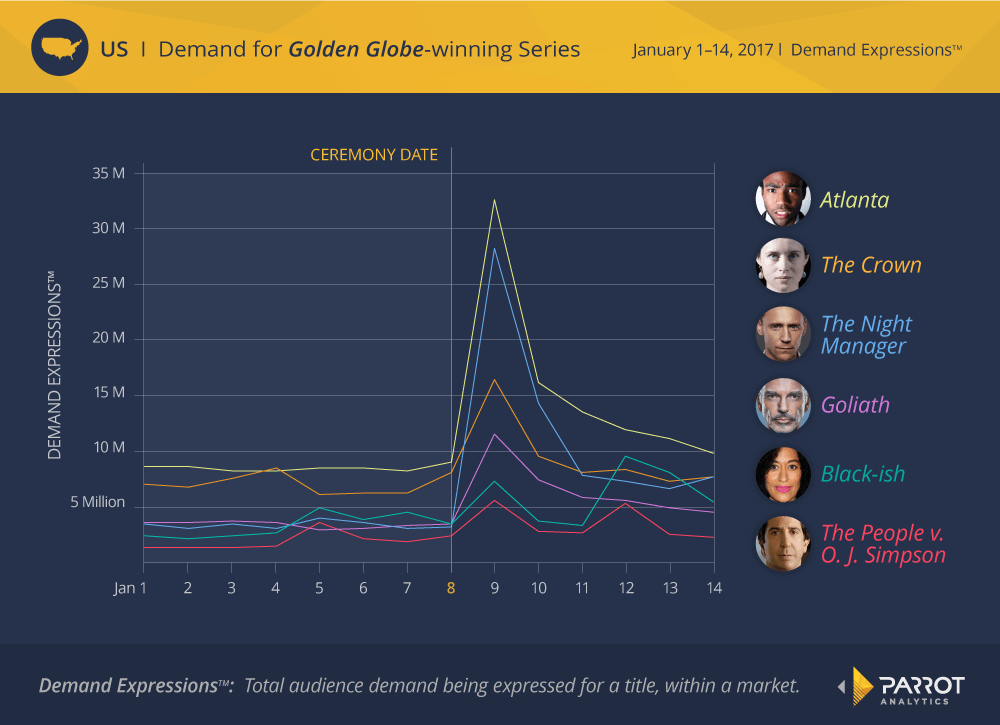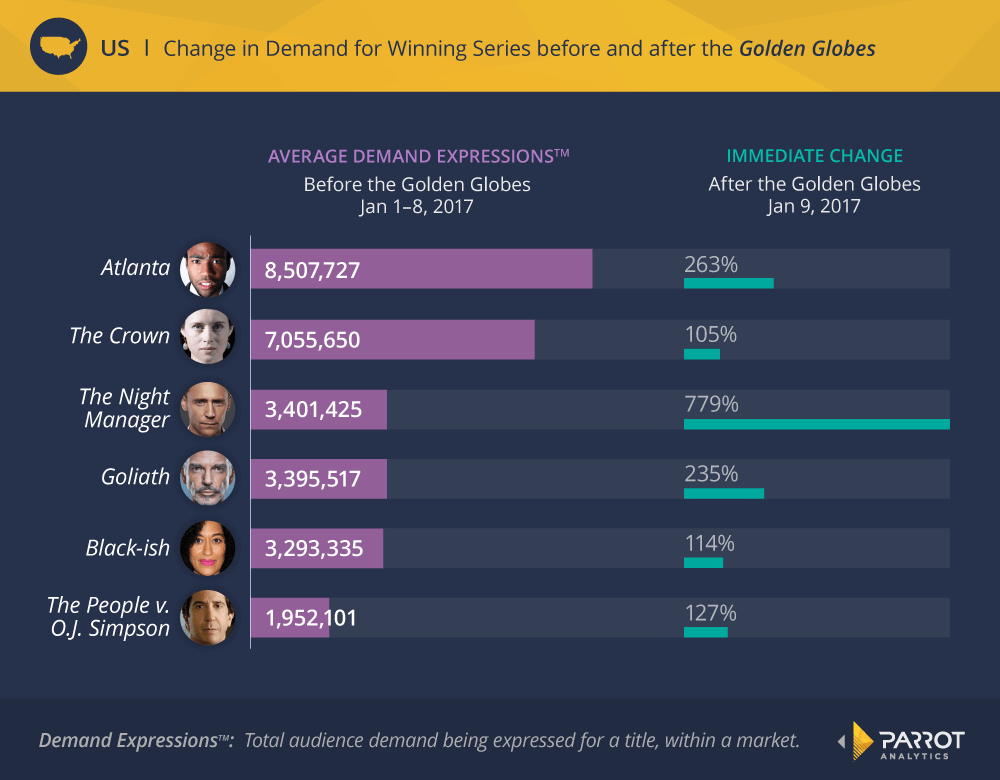Television is often overshadowed at the Golden Globe Awards by film, and this year was no exception. The major story this year was La La Land, which became the most successful movie in Golden Globes history by winning all seven of its nominations. However, worthy new series and awards veterans alike were honored in television, but do these Golden Globe winners enjoy the same level of exposure as at the Emmys? To answer this question, we compare the patterns of demand for winning series to their Emmy counterparts, which we previously explored in this analysis.
The Golden Globes have fewer TV awards than the Emmys, so while the Emmys had 16 winning series, the Golden Globes only had six:
- Atlanta (Best Comedy and Actor in a Comedy)
- The Crown (Best Drama and Actress in a Drama)
- The People vs. O.J. Simpson (Best Miniseries and Actress in a Miniseries)
- Goliath (Best Actor in a Drama)
- Black-ish (Best Actress in a Comedy)
- The Night Manager (Best Actor in a Miniseries and Supporting Actor and Actress)
Half of the winners— The People v. O.J. Simpson, The Night Manager, and Black-ish — were nominated at the Emmys last year, but Atlanta, The Crown, and Goliath made their awards ceremony debut at the Golden Globes. Regardless of whether they had won before, all six titles saw an increase in demand after the event on January 8th:

This effect resembles the pattern of demand for Emmy-winning titles, with a major spike in demand the day after the awards ceremony. Atlanta, which had the highest demand going into the awards, also had the largest peak. On the day after the Golden Globes, its popularity measured over 30 million Demand Expressions™, making Atlanta the third-most popular title in the United States. The Night Manager, which aired last April, ranked fifth in the US after winning three Golden Globes for its acting. In contrast, The People v. O.J. Simpson, which aired in February, had only a modest spike and remained the least in-demand series out of the six winners. Its five major wins at the Emmys may have already generated as much awards-driven popularity as the show could have earned. The two digital original series, The Crown and Goliath, saw moderate spikes in demand after the Golden Globes, while Black-ish had more of an increase after its episode airing on January 11th.
Winning a Golden Globe (or two, or three) clearly affected the overall demand for these titles. However, those that were nominated but did not win did not enjoy such an impact. To quantify this difference, the immediate change in demand for Golden Globes series was calculated by finding the percent increase in demand between January 8th and 9th. For nominated but not winning titles, their demand changed by an average of 13% on that day, which is well within the normal range (for these titles, the average daily change was 3% with a standard deviation of 25%). For winning titles, though, their average change was 271%, confirming that their demand was significantly affected by the Golden Globes.
How does this change in demand compare to the spike in popularity for winning an Emmy? The average immediate change in demand for Emmy-winning titles was only 206%, less than the 271% for the Golden Globes. The Golden Globes had fewer winning shows and so interest in them may not have been as diluted as for the 16 winners at the Emmys.
At the Emmys, another important aspect of the immediate demand change was its inverse relationship with the demand for the show before the awards. The less popular a title before its win, the greater its spike in demand after the awards. We broke down the change in demand by show to determine whether this relationship holds for the Golden Globes.

Instead of the strong -0.806 correlation between the two measures for the Emmys, the average demand and immediate change after the Golden Globes had a weak 0.26 correlation. Due to the small sample size and low correlation, this result was not significant: the boost in demand for Golden Globes winners was not related to the title’s popularity beforehand. With fewer winners, each title attracted more demand on average and all (except The Night Manager) got similar amounts of attention, whereas for the Emmy winners, the choice between 16 winners caused viewers to prioritize their demand activities towards titles they had not seen before.
While both the Emmys and Golden Globes reward the best in television over the past year, the patterns of demand for the winning titles are not entirely the same. Both sets of winners enjoy a significant increase in demand after their win, but the Golden Globes winners benefit more. And while lesser-known shows at the Emmys experience the largest spikes in popularity, there is no relationship between demand and immediate change for Golden Globe winners. The number of winners (16 for the Emmys, 6 for the Golden Globes) seems to explain these differences: it is easier for all winners to attract attention when there is less competition for this post-awards popularity.

